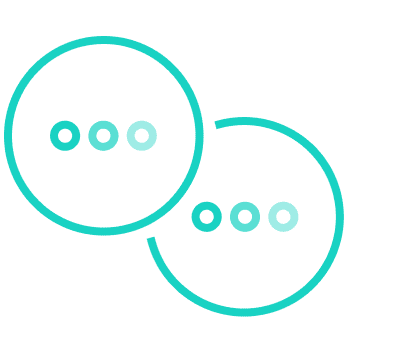Developments in technology and artificial intelligence in recruitment are intensifying, bringing more efficiency to the hiring process.
Although the use of AI does need to be carefully monitored to avoid pitfalls such as the potential for built-in bias or discrimination, it brings a wide array of benefits including cost savings, greater retention and an improved candidate experience.
How can artificial intelligence be used in recruitment?
Artificial intelligence (AI) in recruitment is the application of recruitment AI technology within the hiring process to streamline and automate various aspects of it.
It refers to any digital tools that simulate human intelligence and mimic recruiters’ actions while conducting tasks such as sourcing, interviewing and hiring candidates.
AI recruiting tools can be used to complete a variety of tasks that would previously have been performed manually. These include processes such as scanning job applications to select candidates that fit certain requirements, conducting pre-employment assessments, or generating insights into your talent pool.
Artificial intelligence in recruitment brings a host of benefits, including cost savings, making the process more efficient and allowing recruiters to focus on bigger picture issues. Here are four reasons why AI recruiting software can transform the recruitment process:
Overcoming bias: AI recruiting tools can screen candidates objectively based on factors such as qualifications and experience. This removes the chance of human bias and unconscious bias entering the process and resulting in unfair, sub-optimal results. Using AI hiring software counteracts such bias and can result in organisations having a more diverse workforce.
Increase efficiency: Sifting through hundreds and hundreds of CVs or scheduling interviews are long-winded, admin-heavy jobs. Artificial intelligence in recruitment will do many of these time-consuming jobs for you, increasing productivity and allowing hiring managers to focus on strategic tasks that will deliver results for your organisation.
Hire better candidates: According to the Recruitment & Employment Confederation, a bad hire can cost organisations up to three times their annual salary. AI recruiting addresses this issue by assessing candidates based on data to help ensure the best person for the job is chosen.
Improved candidate experience: An inefficient recruitment process can be very off-putting for candidates, leading them to drop out of an application or even decline a job offer. A poor process can also harm an organisation’s brand. By using artificial intelligence in recruitment, the process becomes more streamlined, efficient and ultimately more enjoyable for candidates.
Different types of recruitment tools
The impact of artificial intelligence in recruitment can be seen across several processes:
Screening
AI recruiting software can be used to automate the screening of CVs, scanning them to make sure candidates reach certain requirements – for example, do they have a driving licence – and learning what experience, skills and qualifications they have in order to rank them and create a shortlist of the best people. AI hiring software is also used to scan public data sources, such as social media, to find additional information which may be useful when assessing a candidate.
Interview question generators
AI recruiting tools and interviewing tools, such as Reed’s interview question generator , provide a powerful way to create customised interview questions for any role, in any sector. Such tools will craft the ideal set of interview questions in minutes to save hiring managers time and effort, while ensuring the questions they ask are relevant to their business and the job in question. AI interviewing tools can also assess a candidate’s performance during an interview by analysing their speech patterns and body language.
Automated outreach tools
AI hiring software can be used as outreach tools to make the recruitment process more efficient and faster. These tools are particularly useful for organisations which are dealing with several recruitment processes at once. A single click can be made to send out survey links or job offers to multiple candidates. Intelligent outreach tools are also able to help candidates book a time in an organisation’s calendar for an interview.
Virtual assistants
Virtual assistants and Chatbots provide candidates with 24/7 access to interactive conversations, addressing frequently asked questions or providing feedback on the recruitment process. Chatbots give candidates fast answers to their queries meaning they remain happy and engaged with the process, while freeing up time for hiring managers.
Onboarding processes
Using artificial intelligence in recruitment and onboarding processes will lead to a reduction in errors by automating repetitive tasks, such as sending out documentation. It is easy to empower AI recruiting tools with pre-defined instructions for candidates to upload any documents into an organisation’s system. Artificial intelligence simplifies the onboarding process by automating mundane tasks and generating responses.
What is certain is artificial intelligence in recruitment is here to stay, with new and emerging technologies such as augmented reality giving hiring managers more and more tools to make their processes more efficient and cost-effective.
What is the future of artificial intelligence hiring?
It is easy to see why artificial intelligence in recruitment is proving so popular, but despite the increasing role of AI hiring software there remains a definite need for the human touch in the hiring process.
Hiring managers and candidates love the efficiency AI brings, but they also value the ability to have conversations. Recruiters and businesses want a process which is both efficiently automated and humanly personalised.
The human touch provides a degree of intuition, often based on personal experience, that AI hiring software cannot replicate. Artificial intelligence may have access to all the data on the internet, but it does not have the natural empathy a human does.
The future of artificial intelligence in recruitment is in influencing tasks which take hiring managers a long time to do, freeing them up to do more important work. AI recruiting software can influence talent acquisition processes in the following ways:
AI recruiting tools can identify potential candidates who have the necessary skills and qualifications for a job – even if they haven’t applied for it.
Artificial intelligence is able to screen large numbers of CVs at speed, matching requirements with qualifications and experience.
AI hiring software can analyse candidate data, such as their CV, social media profiles and online behaviour, to predict which candidates will be best suited to a specific role.
Chatbots provide applicants with immediate assistance, answering questions about the company or job application process.
AI recruiting software and video interviewing tools can conduct pre-screening interviews, saving time and money.
AI powered recruitment to improve equality and diversity
Implementing artificial intelligence in recruitment has the potential to increase the diversity and inclusion of an organisation’s hiring.
AI recruiting software can remove inherent bias from the recruitment process and quickly identify relevant candidates. By scanning CVs for qualifications, while ignoring factors such as gender, race and age, AI tools allow organisations to cast a wider, more inclusive net.
Such tools can also be used to monitor the success of diversity and inclusion schemes, tracking the progress of recruitment initiatives.
If you want to learn more about how to implement artificial intelligence in your talent acquisition process, download our guide ‘Seven steps to implementing AI in talent acquisition’.






